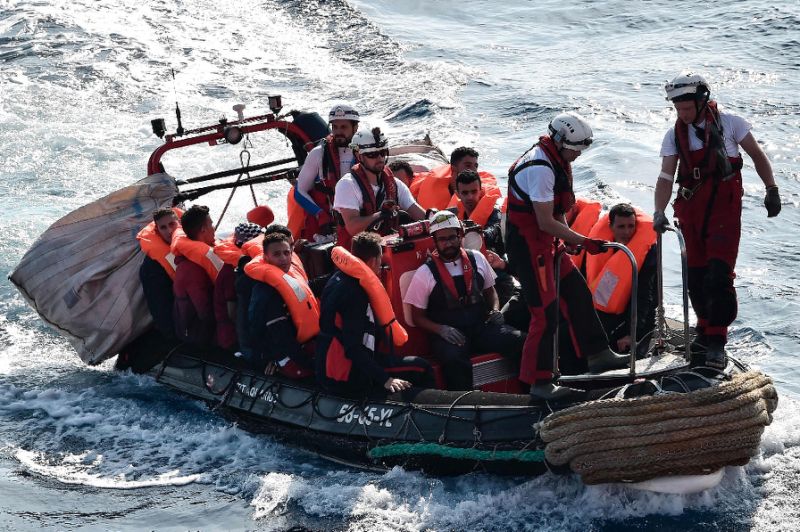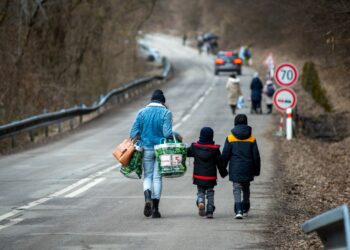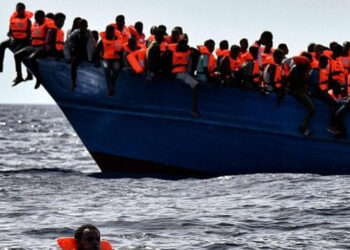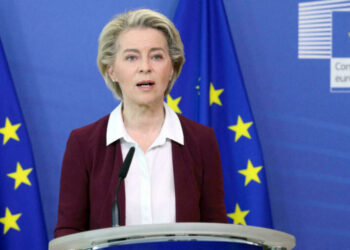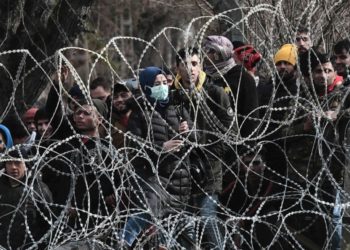The annual Global Trends Forced Displacement report, that was issued by the U.N. refugee agency (UNHCR), indicates that the number of people who are forcibly displaced from their homes reached 68.5 million at the end of last year.
Almost 40 percent (25.4 million) of these people crossed an international border, qualifying them as refugees. The remaining 60 percent (40 million) did not leave their country and are internally displaced persons (IDPs). Although the factual situation between refugees and IDPs may in many ways be identical, their legal position is vastly different.
IDPs remain within the jurisdiction of their country of origin or habitual residence. Although human rights and guiding principles on internal displacement apply to IDPs, they have to be implemented by the very states that either caused their displacement or failed to prevent it, which bodes ill for the improvement of their plight. The question is whether refugees fare better in this respect. In theory, definitely yes. Refugees may benefit from the 1951 Refugee Convention and 1967 Protocol relating to the Status of Refugees, ratified by three-quarters of all states worldwide. In practice, however, the picture is less rosy.
When it comes to refugees, a sense of “crisis” seems to prevail, leading to bad decisions that undermine the effectiveness of the Convention and Protocol to the detriment of their beneficiaries. The crisis rhetoric appears to find its origin in Europe and dates from 2015 when 1 million predominantly Syrian refugees made their way to the continent. This number caught Europe unaware and led to many states hastily erecting fences – over 800 miles since 2015 – intending to denying refugees access to their territories, and in 2016, to the infamous E.U.-Turkey deal. This deal ensures that refugees are contained in Turkey and thus remain outside of the E.U. Even though the numbers of refugees trying to access Europe has decreased since 2015, the E.U. still finds itself in crisis mode, feverishly organizing migration summits.
Crisis of Governance
Arguably, there is a crisis, but it is not one of numbers. After all, even at the 2015 peak, the total influx of refugees in the E.U. amounted to much less than 1 percent of Europe’s population. The crisis is instead one of governance: a lack of solidarity where Italy and Greece are by virtue of the Dublin III Regulation bound to process the claims of all those who arrive by boat; and a lack of solidarity regarding the international community which manifests itself in shady deals with countries like Libya – comparable new deals with North African states appear to be in the offing – that all gear to prevent triggering obligations under the Convention and Protocol. Thus setting a bad example for the rest of the world.
The majority of refugees are, however, hosted outside of the E.U. Many millions are hosted by states that did not even ratify the Convention and Protocol, like Pakistan, Lebanon, and Jordan. Turkey hosts 3.5 million Syrian refugees, even though its obligations under the Convention and Protocol are confined to European refugees. In general, 85 percent of the world’s refugees are hosted by developing states: it is they who bear the brunt and have been doing so for decades.
So, the problem appears to be the uneven distribution of responsibilities, but this is nothing new. The drafters of the 1951 Convention were well aware of the fact that the grant of asylum could result in unduly heavy burdens on certain countries. This recognition was inserted in the preamble of the Convention, along with the observation that international cooperation would be required to address this imbalance. However, this observation was not supplemented by a binding obligation to share in the Convention. As a result, the distribution of responsibilities is governed by geographical proximity.
Time to Share Responsibility
It is time the omission to address sharing responsibility equitably is taken up. The perfect venue for this would be the UNHCR Global Compact on Refugees that will be completed in the fall of 2018 in the form of a Comprehensive Refugee Response Framework and corresponding program of action.
The Global Compact originates in the New York Declaration for Refugees and Migrants, adopted by all 193 U.N. member states in 2016. In the declaration, states underlined the centrality of international cooperation to the refugee protection regime, recognized “the burdens that large movements of refugees place on national resources, especially in the case of developing countries,” and committed themselves to a “more equitable sharing of the burden and responsibility for hosting and supporting the world’s refugees.”
The consensus was promising, but unfortunately it was not coupled to a decision to insert new obligations in the Global Compact. In its roadmap towards the Global Compact, UNHCR indicated that the program of action “will not seek to impose additional obligations on states but will rather seek to outline how existing obligations can best be fulfilled and – importantly – how the responsibility for performing those obligations can be more equitably shared.”
The latest draft emphasizes that “good faith” and “common trust” are the basis for equitable sharing. Even in the rather closely-knit E.U., in which member states could reasonably be expected to demonstrate solidarity towards fellow members, the decision to relocate 160,000 asylum seekers within Italy and Greece failed, resulting in the transfer of a mere 30,000 asylum seekers to other E.U. states. It induced Italy’s newly constituted populist government (“Italians first” had been the election slogan) to enforce greater solidarity by refusing to dock the Aquarius carrying 629 migrants who had been rescued at sea.
Sharing the responsibility for 28.5 million refugees among 193 states in an equitable manner is the challenge. This requires good governance and, in particular, a global plan backed by binding commitments rather than mere good faith and common trust.
Disclaimer: The views and opinions expressed here are those of the author and do not necessarily reflect the editorial position of The Globe Post.

